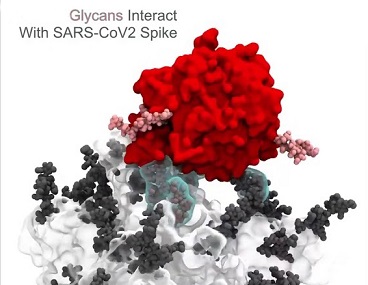Groundbreaking German Study Reveals How SARS-CoV-2 Alters Respiratory Tract Glycosylation Patterns in Hamsters
Nikhil Prasad Jul 30, 2023 2 years, 6 months, 2 weeks, 19 hours, 36 minutes ago
Alterations in glycosylation patterns can affect virus binding efficiency, host cell entry, virus replication, and exocytosis.
COVID-19 News: In a groundbreaking research effort by AbbVie Deutschland GmbH & Co. KG, Ludwig-Maximilians-University, and the Federal Research Institute for Animal Health in Germany, a significant breakthrough has been made in understanding the pathophysiological processes of Coronavirus Disease 2019 (COVID-19).

The study focused on severe acute respiratory syndrome coronavirus type 2 (SARS-CoV-2) infection and its impact on the glycosylation patterns in the respiratory tract. After over two years of intensive investigation, researchers have shed light on the vital virus-host interactions that occur at the respiratory epithelium, which play a crucial role in the progression of the infection.
Glycosylation, the process of attaching polysaccharides called glycans to proteins, is known to affect the stability and functionality of glycoconjugates. Lectins, glycan-binding proteins that recognize specific glycan motifs, have been used as a tool to visualize and examine glycosylation pattern changes in tissues. The researchers employed lectins with different glycan-specificities to investigate glycosylation pattern changes in the respiratory tract of Golden Syrian hamsters infected with SARS-CoV-2.
The study unveiled remarkable insights into the damage caused by the virus in the respiratory tract. Some lectins revealed damage to alveolar type 1 pneumocytes, while others visualized the loss and subsequent hyperplasia of type 2 pneumocytes. Additionally, lectin staining was co-localized with a proliferation marker, indicating active cell division in the affected tissue. Further double staining of lectins with specific immune cell markers demonstrated the dominant infiltration of monocyte-derived macrophages into infected alveolar tissue.
SARS-CoV-2 infection is initiated when virus particles penetrate the nasal mucus layer and enter nasal epithelial cells, leading to virus replication. From there, the virus travels along the airways into the lower respiratory tract, causing a range of respiratory symptoms from mild to severe, including cough, dyspnea, and respiratory distress syndrome as covered in previous studies and
COVID-19 News reports. The virus can also lead to inflammation, multi-organ dysfunction, and various cardiovascular and neurological symptoms.
The study focused on glycans attached to proteins within the respiratory tract, as they significantly impact the infection process. Alterations in glycosylation patterns can affect virus binding efficiency, host cell entry, virus replication, and exocytosis, thus shaping viral distribution, innate and adaptive immune responses, and disease progression.
Understanding these glycosylation mechanisms may pave the way for the development of new therapeutic approaches, vaccines, and serological testing strategies.
To study these glycosylation changes, the Golden Syrian hamster was chosen as a preclinical model for SARS-CoV-2 infection due to its similarities to humans in terms of viral
replication and histopathological evidence of disease. The researchers aimed to unravel the alterations in glycosylation patterns of the mucins, high molecular glycoproteins secreted by epithelial goblet cells, which form the main part of the mucus gel covering the epithelium. Changes in mucin glycosylation patterns have been linked to the progression of respiratory diseases like cystic fibrosis.
Lectin histochemistry, which visualizes specific glycan glycosylation patterns, was used to identify alterations in the respiratory tract of SARS-CoV-2 infected hamsters. The results revealed significant changes in the glycosylation patterns during viral infection, offering valuable insights into the pathology of the disease and potential therapeutic targets.
This study marks a major step forward in the understanding of SARS-CoV-2-induced changes in the respiratory tract's glycosylation patterns. The findings could open new avenues for therapeutic development, leading to better management and treatment of COVID-19 and other infectious diseases affecting the respiratory system.
The study findings were published in the peer reviewed journal: Acta Histochemica. (Science Direct)
https://www.sciencedirect.com/science/article/abs/pii/S0065128123000831
For the latest
COVID-19 News, keep on logging to Thailand Medical News.
